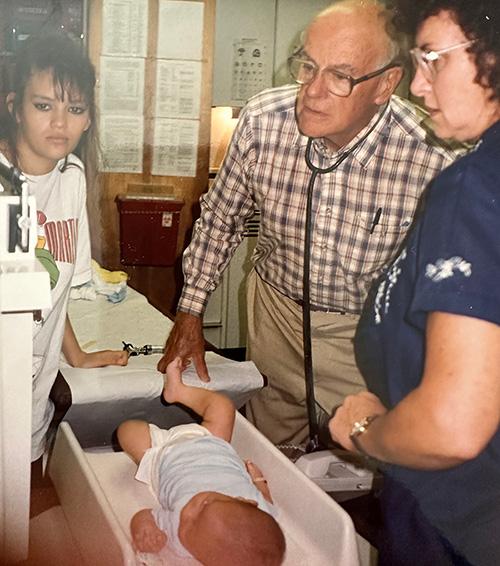

What We Can Learn from Dr. Bob’s 1991 Letter in the Journal of the American Medical Association
In 1991, Zufall Health—then known as the Dover Community Clinic—was a new organization with limited resources. Urologist Robert Zufall, M.D. (“Dr. Bob”), and his wife and medical business assistant, Kathryn (“Kay”), founded the small, one-night-a-week clinic after retiring from their nearby private practice.
The same year, Dr. Bob wrote about the Dover Community Clinic in a letter to the editor of the Journal of the American Medication Association (JAMA), a highly respected medical journal. The Zufalls made essential medical services available to all patients and reduced the strain on the local health care system, Dr. Bob said in his letter.
Dr. Bob’s words in JAMA are still significant today. After more than 30 years, our work is guided by the Zufalls’ model of care for everyone regardless of financial, immigration, or insurance status. We have upheld many of our founders’ original practices, including a sliding scale fee system, access to low-cost medication from pharmacies, and referrals to local specialty providers. And this work is only possible thanks to the communal effort of many—Board members, foundations, corporations, donors, volunteers, and policymakers.
The letter also reveals that the need for health care services for vulnerable people has increased dramatically. Today, we serve nearly 45,000 people per year, compared to Dr. Bob’s estimate of roughly 1,000 in our health center’s early days. Zufall’s high-quality, affordable services are more urgently needed than ever before. Our staff is proud to remain aligned with our founders’ vision to carry out this important work and build a healthier, more equitable community.
The full text of Dr. Bob’s 1991 letter is available here and below:
May 15, 1991
My wife and I operate a free clinic that might serve as one model for provision of medical care to the uninsured. The clinic provides basic primary care and pediatric immunizations to people who cannot afford $50 for a blood pressure check or $100 for shots.
It is open one night a week in the office of a local Hispanic community organization, and 15 to 20 patients are seen each night. They are screened for ability to pay, but almost everyone is accepted; a donation of $1 to $5 is encouraged. There are two to four volunteer physicians, one or two volunteer nurses, one or two volunteer secretaries, and one or two paid translators. Modest overhead costs are paid. The budget is under $10000 a year, or about $10 per patient visit. Start-up costs for basic office equipment were about 3000, given by Warner Lambert. We also have grants from United Way and the Robert Wood Johnson Foundation.
About 20 local physicians in various specialties have agreed to see referrals for no fee or a reduced fee, and patients are also referred to the local hospital clinics, for example, the prenatal clinic. At the hospital they are screened and pay on a sliding scale: up to $100 a visit.
We perform urine tests, measure hemoglobin and blood glucose levels, and carry out pregnancy tests. Roentgenograms and other laboratory work are performed at the hospital. Prescriptions are filled at a local pharmacy that has agreed to give discounts. A local optometrist provides glasses at cost. The emphasis is on basic, no-frills medicine. Tests are ordered sparingly, and a drug supply house catalog is used to check on the cost of medications. Immunizations are supplied for free by the state. Because of our low overhead, services can be provided much more cheaply than in the hospital clinics, and the hospital is relieved of a financial burden.
We are ourselves volunteers, and to some extent, we depend on volunteers. Medical care for the uninsured is either going to take either a lot of money or a lot of volunteers. There’s still a little public and private money around, and, with proper organization and encouragement, there may be enough volunteers.
Robert Zufall, M.D.
Dover, NJ

